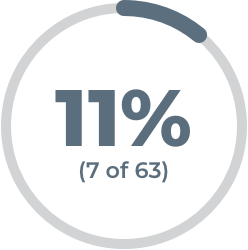2 studies looked at effectiveness and safety
The VYVGART for IV infusion study explored the effectiveness and safety of VYVGART for IV infusion in adults with anti-AChR antibody positive gMG.
The VYVGART Hytrulo for subcutaneous injection study compared safety and antibody reduction—which is related to gMG symptoms—in patients taking either VYVGART Hytrulo for subcutaneous injection or VYVGART for IV infusion.
The VYVGART for IV infusion study
The main goals of this study were to see how VYVGART for IV infusion improved daily abilities and reduced muscle weakness in patients taking VYVGART for IV infusion plus their current oral gMG treatment, compared to those taking placebo plus their current oral gMG treatment.
68% (44 of 65) of patients who added VYVGART for IV infusion to their current oral gMG treatment significantly improved their ability to perform daily activities, as measured by the MG-ADL scale.*
Compared to 30% (19 of 64) of patients on placebo plus their current oral gMG treatment.
63% (41 of 65) of patients who added VYVGART for IV infusion to their current oral gMG treatment saw a significant reduction in muscle weakness, as measured by the QMG scale.†
Compared to 14% (9 of 64) of patients on placebo plus their current oral gMG treatment.
The VYVGART for IV infusion study:
VYVGART was evaluated in a global study of adults with anti-AChR antibody positive gMG. The primary goals of the study were to examine effectiveness (improved daily abilities and reduced muscle weakness) and safety for FDA approval of VYVGART. The study examined the effectiveness and safety of VYVGART in 167 adults (18 years or older) with gMG. In addition to their current treatment, patients received either VYVGART or placebo.
*“Improved daily abilities” was defined as a decrease of 2 or more points on the MG-ADL scale. The improvement had to be maintained for 4 or more weeks, with the first improvement occurring within 1 week of the last infusion of treatment cycle 1. The MG-ADL scale measures the severity of 8 common symptoms of gMG. A lower score means less severe symptoms.
†“Reduced muscle weakness” was defined as a decrease of 3 or more points on the QMG scale. The improvement had to be maintained for 4 or more weeks, with the first improvement occurring within 1 week of the last infusion of treatment cycle 1. The QMG scale assesses muscle weakness in gMG based on 13 items. A lower score means less muscle weakness.
MG-ADL=Myasthenia Gravis Activities of Daily Living; QMG=Quantitative Myasthenia Gravis
- See as a graph
- See as a table
Average reduction in MG-ADL score during treatment cycle 1
a After 4 weeks of treatment with VYVGART for IV infusion, patients improved an average of 4.6 points on the MG-ADL scale. Patients on placebo plus their current oral gMG treatment improved an average of 1.8 points.
b Patients did not come in for an evaluation at week 9.
Swipe to see full graph
VYVGART for IV infusion was determined to be effective if a patient’s MG-ADL score decreased by 2 or more points and stayed at that level for 4 weeks or more in a row, with the first improvement occurring no later than 1 week after the last infusion of treatment cycle 1.
VYVGART for IV infusion study design: VYVGART was evaluated in a global study of adults with anti-AChR antibody positive gMG.
The study examined the effectiveness and safety of VYVGART in 167 adults (18 years or older) with gMG. In addition to their current gMG treatment, patients received either VYVGART or placebo.
Patients in this study needed to meet the following criteria:
- Adult (18 or older)
- Myasthenia Gravis Foundation of America (MGFA) clinical classification class II to IV
- MG-ADL score of 5 or more
- On a stable dose of their current gMG treatment throughout the study
Patients represented a range of adults with gMG:
- Median time since gMG diagnosis was 9 years
- MGFA class ranged from II to IV at the start of the study
The MG-ADL scale was used to measure gMG symptoms:
- The MG-ADL scale assesses the impact of gMG on daily functions by measuring 8 signs or symptoms that are commonly affected in gMG: the ability to speak, chew, swallow, breathe, brush teeth or comb hair, and get out of a chair, as well as the frequency of double vision and eyelid droop
- Each item is measured on a 4-point scale, where a score of 0 represents normal function and a score of 3 represents the loss of ability to perform that function. Total scores range from 0 to 24 points, with a higher score showing more severe gMG
- VYVGART for IV infusion was determined to be effective if an anti-AChR antibody positive patient’s MG-ADL score decreased by 2 or more points and stayed at that level for 4 weeks or more in a row, with the first improvement occurring no later than 1 week after the last infusion of treatment cycle 1
The QMG scale was used to measure muscle weakness:
- Improvement maintained for 4 or more weeks was measured by a decrease of 3 or more points on the Quantitative Myasthenia Gravis (QMG) scale, with the first reduction occurring no later than 1 week after the last infusion of treatment cycle 1
- The QMG scale assesses muscle weakness in gMG based on 13 items. Each item is assessed on a 4-point scale, where a score of 0 represents no muscle weakness and a score of 3 represents severe muscle weakness. Total scores range from 0 to 39, with a higher score meaning muscle weakness is more severe
MGFA=Myasthenia Gravis Foundation of America
The VYVGART Hytrulo for subcutaneous injection study
In this study, VYVGART Hytrulo for subcutaneous injection and VYVGART for IV infusion had a similar average reduction in the harmful AChR antibodies that cause gMG symptoms.
VYVGART Hytrulo study design: The study compared antibody reduction in 110 adults, 18 years or older, with gMG. Patients remained on their current gMG treatment and were given either VYVGART Hytrulo for subcutaneous injection or VYVGART for IV infusion.
The criteria for participating in the study were the same as in the study that measured the safety and effectiveness of VYVGART for IV infusion.
Additional data from the VYVGART for IV infusion study
The following data points were not the main goals of the study and do not carry the same weight as the main goals of the study. No reliable conclusions can be drawn about the effectiveness or safety of VYVGART for IV infusion based on these data points. Talk to your neurologist if you have any questions.
MG-ADL data during treatment cycle 1
of patients who added VYVGART for IV infusion to their current oral gMG treatment were observed to have an MG-ADL score of 0 or 1, which means minimal or no symptoms, during at least 1 visit during their first treatment cycle

of patients on placebo plus their current oral gMG treatment were observed to have an MG-ADL score of 0 or 1, which means minimal or no symptoms, during at least 1 visit during their first treatment cycle
The MG-ADL scale is an assessment tool that measures the severity of 8 common symptoms of gMG. Each item is scored on a 4-point scale—a score of 0 means “normal,” and a score of 3 means “loss of ability.” The total score can range from 0 to 24 points, with a higher score showing more severe gMG.
MG-ADL data after 2 treatment cycles
of patients who added VYVGART for IV infusion to their current oral gMG treatment were observed to have an MG-ADL response by the time they completed a second treatment cycle‡
of patients on placebo plus their current oral gMG treatment were observed to have an MG-ADL response by the time they completed a second treatment cycle§
MG-ADL response was defined by a decrease of 2 or more points on the MG-ADL scale, maintained for 4 or more weeks.
‡44 of 65 patients on VYVGART for IV infusion had an MG-ADL response during treatment cycle 1. Of the 21 patients who didn’t have a response, 7 responded during the second treatment cycle.
§19 of 64 patients on placebo plus their current gMG treatment had an MG-ADL response during treatment cycle 1. Of the 45 patients who didn't have a response, 9 responded during the second treatment cycle.
Things to discuss with your doctor before starting VYVGART
VYVGART for IV infusion is the #1 prescribed FDA-approved biologic treatment for adults with anti-AChR antibody positive gMG||
VYVGART has been FDA approved for more than 3 years.
||Based on IQVIA LAAD data from January 2023 to April 2024. Data is based on validated claims of VYVGART for IV infusion and other biologics that have been approved by the FDA for the treatment of adults with anti-AChR antibody positive gMG. All claims are associated with patients who received 2 confirmed diagnoses of anti-AChR antibody positive gMG. Patients who were prescribed more than 1 of the biologics in this data set were counted for each biologic prescribed.
¶Based on published policies from Policy Reporter as of August 2024.
AChR=acetylcholine receptor; gMG=generalized myasthenia gravis; LAAD=Longitudinal Access and Adjudication Data
Getting started with VYVGART
VYVGART safety
Learn about safety and side effects for VYVGART for IV infusion and VYVGART Hytrulo for subcutaneous injection.
VYVGART dosing
Breaks between VYVGART treatment cycles are personalized to you. Find out how to work with your neurologist to make the most of your treatment plan.
Real Stories on VYVGART
This video series features real people who speak about the impact of living with anti-AChR antibody positive gMG—and their experiences with VYVGART.
Do not use VYVGART if you have a serious allergy to efgartigimod alfa or any of the other ingredients in VYVGART. Do not use VYVGART HYTRULO if you have a serious allergy to efgartigimod alfa, hyaluronidase, or any of the other ingredients in VYVGART HYTRULO. VYVGART and VYVGART HYTRULO can cause serious allergic reactions and a decrease in blood pressure leading to fainting.
VYVGART and VYVGART HYTRULO may cause serious side effects, including:
- Infection. VYVGART and VYVGART HYTRULO may increase the risk of infection. The most common infections for efgartigimod alfa-fcab-treated patients were urinary tract and respiratory tract infections. Signs or symptoms of an infection may include fever, chills, frequent and/or painful urination, cough, pain and blockage of nasal passages/sinus, wheezing, shortness of breath, fatigue, sore throat, excess phlegm, nasal discharge, back pain, and/or chest pain.
- Allergic Reactions (hypersensitivity reactions). VYVGART and VYVGART HYTRULO can cause allergic reactions such as rashes, swelling under the skin, and shortness of breath. Hives were also observed in patients treated with VYVGART HYTRULO. Serious allergic reactions, such as trouble breathing and decrease in blood pressure leading to fainting have been reported with efgartigimod alfa-fcab.
- Infusion-Related Reactions. VYVGART and VYVGART HYTRULO can cause infusion-related reactions. The most frequent symptoms and signs reported with efgartigimod alfa-fcab were high blood pressure, chills, shivering, and chest, abdominal, and back pain.
Tell your doctor if you have signs or symptoms of an infection, allergic reaction, or infusion-related reaction. These can happen while you are receiving your VYVGART or VYVGART HYTRULO treatment or afterward. Your doctor may need to pause or stop your treatment. Contact your doctor immediately if you have signs or symptoms of a serious allergic reaction.
Before taking VYVGART or VYVGART HYTRULO, tell your doctor if you:
- take any medicines, including prescription and non-prescription medicines, supplements, or herbal medicines,
- have received or are scheduled to receive a vaccine (immunization), or
- have any allergies or medical conditions, including if you are pregnant or planning to become pregnant, or are breastfeeding.
What are the common side effects of VYVGART and VYVGART HYTRULO?
The most common side effects in efgartigimod-alfa-fcab-treated patients were respiratory tract infection, headache, and urinary tract infection. Additional common side effects with VYVGART HYTRULO are injection site reactions, including rash, redness of the skin, itching sensation, bruising, pain, and hives.
These are not all the possible side effects of VYVGART and VYVGART HYTRULO. Call your doctor for medical advice about side effects. You may report side effects to the US Food and Drug Administration at 1-800-FDA-1088.
What is VYVGART® (efgartigimod alfa-fcab) for intravenous (IV) infusion and what is VYVGART® HYTRULO (efgartigimod alfa and hyaluronidase-qvfc) for subcutaneous injection?
VYVGART and VYVGART HYTRULO are both prescription medicines, each used to treat a condition called generalized myasthenia gravis, which causes muscles to tire and weaken easily throughout the body, in adults who are positive for antibodies directed toward a protein called acetylcholine receptor (anti-AChR antibody positive).
Please see the full Prescribing Information for VYVGART and the full Prescribing Information for VYVGART HYTRULO, and talk to your doctor.
IMPORTANT SAFETY INFORMATION
Do not use VYVGART if you have a serious allergy to efgartigimod alfa or any of the other ingredients in VYVGART. Do not use VYVGART HYTRULO if you have a serious allergy to efgartigimod alfa, hyaluronidase, or any of the other ingredients in VYVGART HYTRULO. VYVGART and VYVGART HYTRULO can cause serious allergic reactions and a decrease in blood pressure leading to fainting.
VYVGART and VYVGART HYTRULO may cause serious side effects, including:
- Infection. VYVGART and VYVGART HYTRULO may increase the risk of infection. The most common infections for efgartigimod alfa-fcab-treated patients were urinary tract and respiratory tract infections. Signs or symptoms of an infection may include fever, chills, frequent and/or painful urination, cough, pain and blockage of nasal passages/sinus, wheezing, shortness of breath, fatigue, sore throat, excess phlegm, nasal discharge, back pain, and/or chest pain.
- Allergic Reactions (hypersensitivity reactions). VYVGART and VYVGART HYTRULO can cause allergic reactions such as rashes, swelling under the skin, and shortness of breath. Hives were also observed in patients treated with VYVGART HYTRULO. Serious allergic reactions, such as trouble breathing and decrease in blood pressure leading to fainting have been reported with efgartigimod alfa-fcab.
- Infusion-Related Reactions. VYVGART and VYVGART HYTRULO can cause infusion-related reactions. The most frequent symptoms and signs reported with efgartigimod alfa-fcab were high blood pressure, chills, shivering, and chest, abdominal, and back pain.
Tell your doctor if you have signs or symptoms of an infection, allergic reaction, or infusion-related reaction. These can happen while you are receiving your VYVGART or VYVGART HYTRULO treatment or afterward. Your doctor may need to pause or stop your treatment. Contact your doctor immediately if you have signs or symptoms of a serious allergic reaction.
Before taking VYVGART or VYVGART HYTRULO, tell your doctor if you:
- take any medicines, including prescription and non-prescription medicines, supplements, or herbal medicines,
- have received or are scheduled to receive a vaccine (immunization), or
- have any allergies or medical conditions, including if you are pregnant or planning to become pregnant, or are breastfeeding.
What are the common side effects of VYVGART and VYVGART HYTRULO?
The most common side effects in efgartigimod-alfa-fcab-treated patients were respiratory tract infection, headache, and urinary tract infection. Additional common side effects with VYVGART HYTRULO are injection site reactions, including rash, redness of the skin, itching sensation, bruising, pain, and hives.
These are not all the possible side effects of VYVGART and VYVGART HYTRULO. Call your doctor for medical advice about side effects. You may report side effects to the US Food and Drug Administration at 1-800-FDA-1088.
What is VYVGART® (efgartigimod alfa-fcab) for intravenous (IV) infusion and what is VYVGART® HYTRULO (efgartigimod alfa and hyaluronidase-qvfc) for subcutaneous injection?
VYVGART and VYVGART HYTRULO are both prescription medicines, each used to treat a condition called generalized myasthenia gravis, which causes muscles to tire and weaken easily throughout the body, in adults who are positive for antibodies directed toward a protein called acetylcholine receptor (anti-AChR antibody positive).
Please see the full Prescribing Information for VYVGART and the full Prescribing Information for VYVGART HYTRULO, and talk to your doctor.
Do not use VYVGART if you have a serious allergy to efgartigimod alfa or any of the other ingredients in VYVGART. Do not use VYVGART HYTRULO if you have a serious allergy to efgartigimod alfa, hyaluronidase, or any of the other ingredients in VYVGART HYTRULO. VYVGART and VYVGART HYTRULO can cause serious allergic reactions and a decrease in blood pressure leading to fainting.
VYVGART and VYVGART HYTRULO may cause serious side effects, including:
- Infection. VYVGART and VYVGART HYTRULO may increase the risk of infection. The most common infections for efgartigimod alfa-fcab-treated patients were urinary tract and respiratory tract infections. Signs or symptoms of an infection may include fever, chills, frequent and/or painful urination, cough, pain and blockage of nasal passages/sinus, wheezing, shortness of breath, fatigue, sore throat, excess phlegm, nasal discharge, back pain, and/or chest pain.
- Allergic Reactions (hypersensitivity reactions). VYVGART and VYVGART HYTRULO can cause allergic reactions such as rashes, swelling under the skin, and shortness of breath. Hives were also observed in patients treated with VYVGART HYTRULO. Serious allergic reactions, such as trouble breathing and decrease in blood pressure leading to fainting have been reported with efgartigimod alfa-fcab.
- Infusion-Related Reactions. VYVGART and VYVGART HYTRULO can cause infusion-related reactions. The most frequent symptoms and signs reported with efgartigimod alfa-fcab were high blood pressure, chills, shivering, and chest, abdominal, and back pain.
Tell your doctor if you have signs or symptoms of an infection, allergic reaction, or infusion-related reaction. These can happen while you are receiving your VYVGART or VYVGART HYTRULO treatment or afterward. Your doctor may need to pause or stop your treatment. Contact your doctor immediately if you have signs or symptoms of a serious allergic reaction.
Before taking VYVGART or VYVGART HYTRULO, tell your doctor if you:
- take any medicines, including prescription and non-prescription medicines, supplements, or herbal medicines,
- have received or are scheduled to receive a vaccine (immunization), or
- have any allergies or medical conditions, including if you are pregnant or planning to become pregnant, or are breastfeeding.
What are the common side effects of VYVGART and VYVGART HYTRULO?
The most common side effects in efgartigimod-alfa-fcab-treated patients were respiratory tract infection, headache, and urinary tract infection. Additional common side effects with VYVGART HYTRULO are injection site reactions, including rash, redness of the skin, itching sensation, bruising, pain, and hives.
These are not all the possible side effects of VYVGART and VYVGART HYTRULO. Call your doctor for medical advice about side effects. You may report side effects to the US Food and Drug Administration at 1-800-FDA-1088.
What is VYVGART® (efgartigimod alfa-fcab) for intravenous (IV) infusion and what is VYVGART® HYTRULO (efgartigimod alfa and hyaluronidase-qvfc) for subcutaneous injection?
VYVGART and VYVGART HYTRULO are both prescription medicines, each used to treat a condition called generalized myasthenia gravis, which causes muscles to tire and weaken easily throughout the body, in adults who are positive for antibodies directed toward a protein called acetylcholine receptor (anti-AChR antibody positive).
Please see the full Prescribing Information for VYVGART and the full Prescribing Information for VYVGART HYTRULO, and talk to your doctor.







